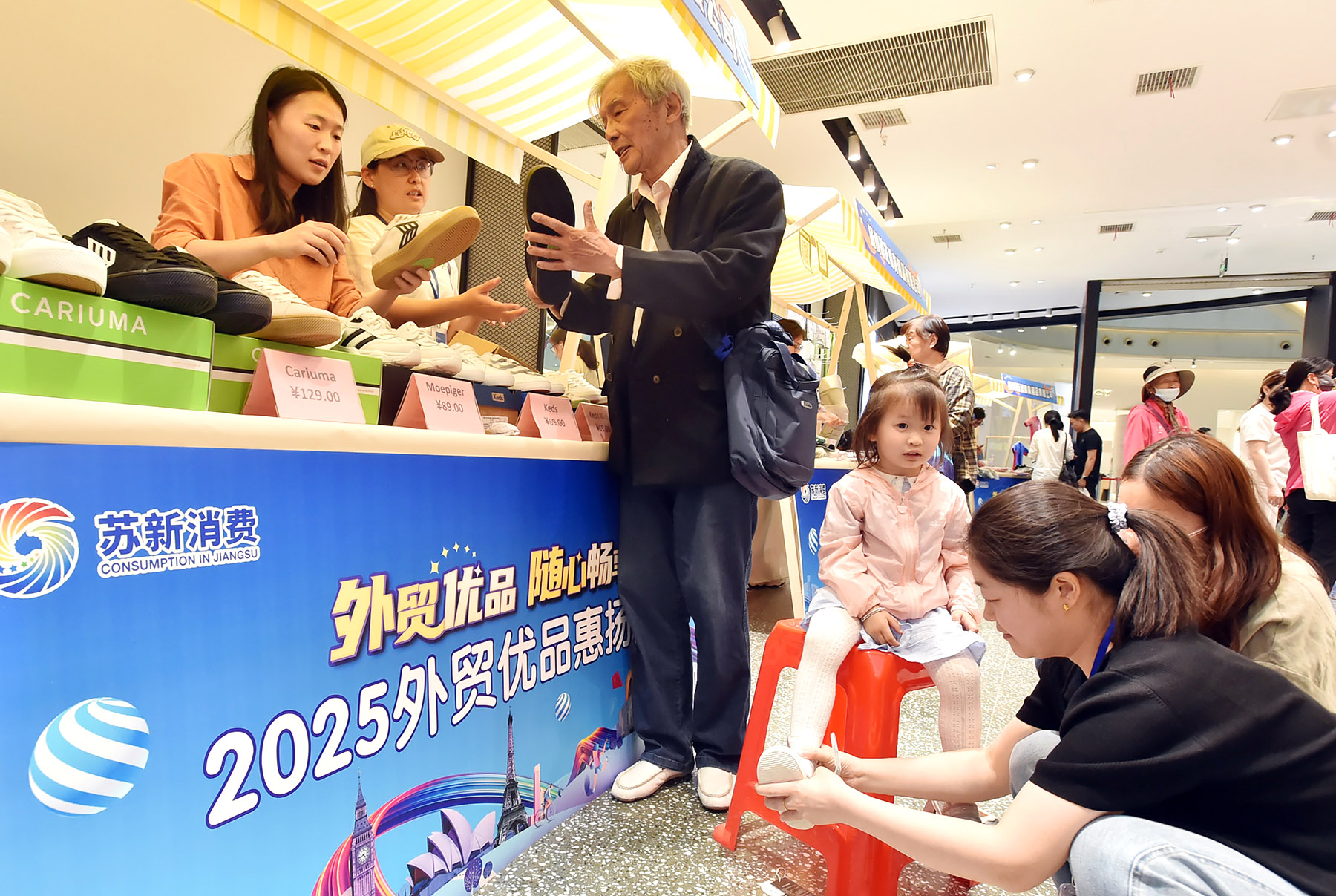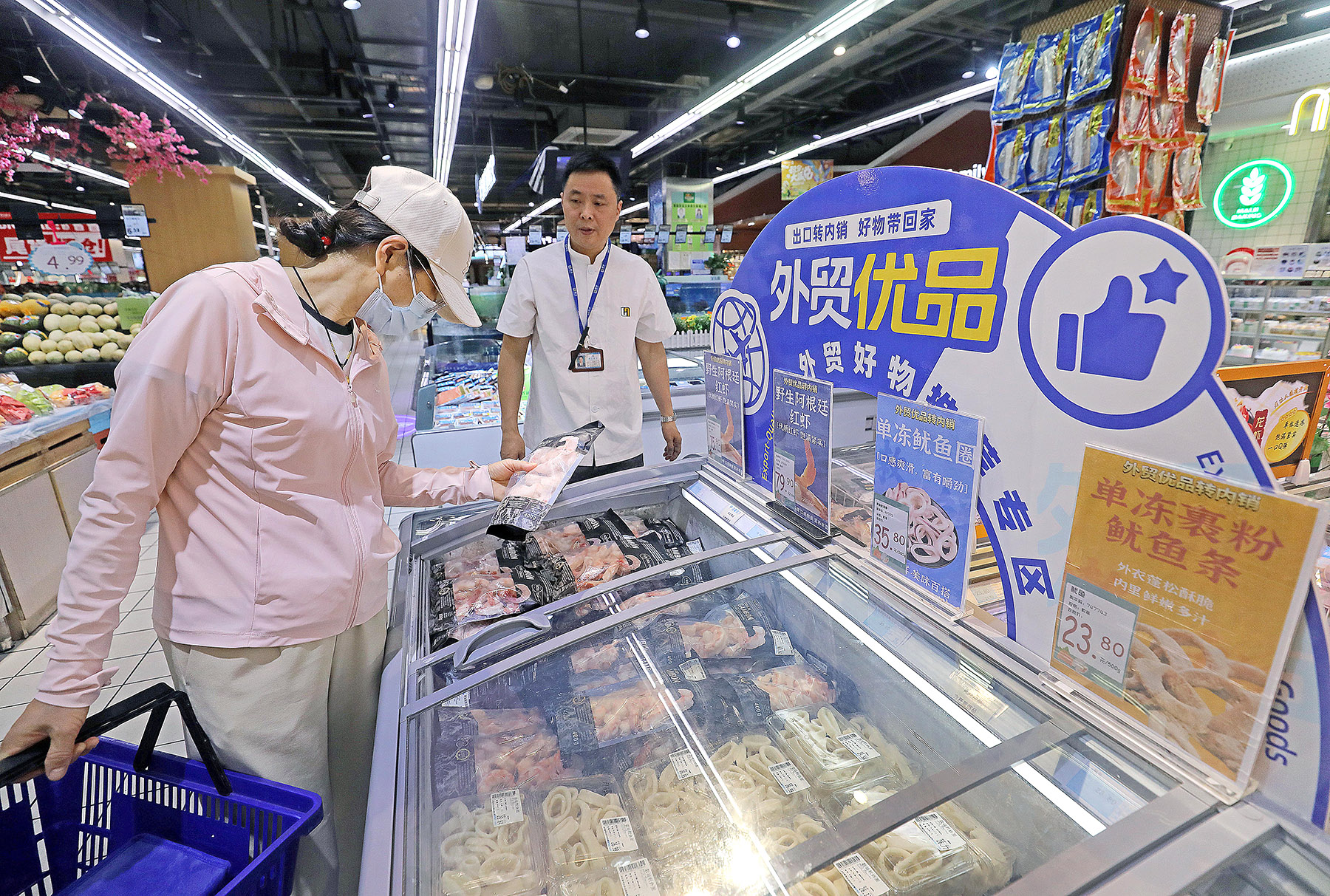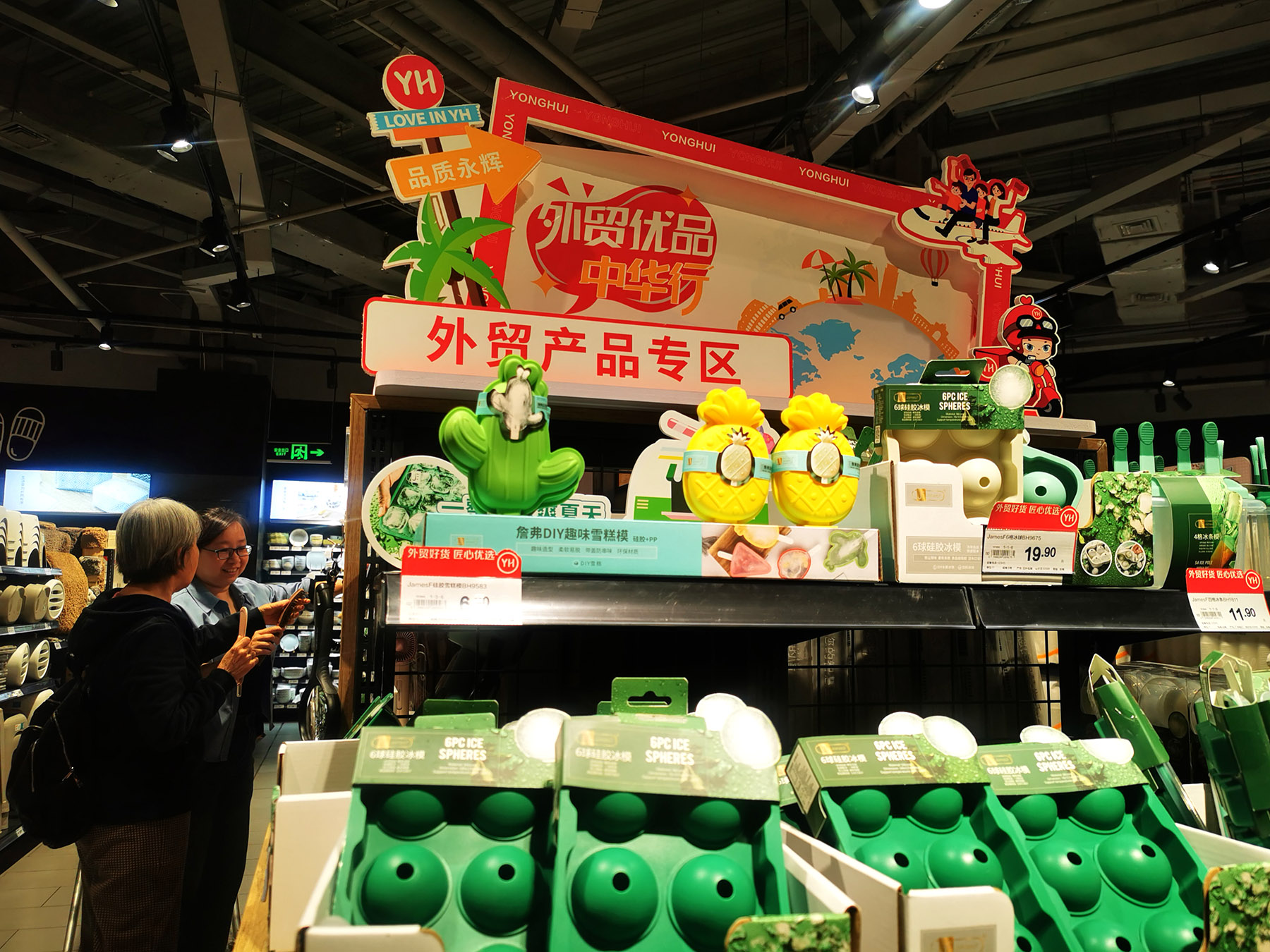Adjusting to local preferences to capitalize on products facing tariffs from US trade conflict is key

China has rolled out a set of measures to help foreign trade companies expand into the giant domestic market to hedge against uncertainties of foreign business.
For China's exporters, switching to sell in the domestic market comes along with challenges, including adapting to different standard and price systems and domestic consumer preferences.
However, China wields great power in tackling trade pressure as it has a huge domestic market with 1.4 billion potential consumers.
READ MORE: China's foreign trade remains stable despite external pressures
To help smooth the transition, the Ministry of Commerce, together with local governments and multiple enterprises, has been taking intensive actions to help foreign trade firms alleviate operational pressures since April.
"The Ministry of Commerce will focus on helping 10 major provinces in foreign trade and consumption, and carry out a series of special matchmaking activities around key industries," said Sheng Qiuping, vice-minister of commerce, during a recent conference.
So far, the activities have been launched in provinces such as Jiangsu, Hainan, Hubei, Hunan and Shandong. The events have mainly focused on helping industries with foreign trade advantages like light industry, household appliance, furniture and home furnishings, and food, according to the commerce ministry.
"As the world's second-largest consumption market, China has the largest middle-income group in the world, with stable growth in investment and consumption and enormous potential," said Xu Man, a researcher at the Chinese Academy of International Trade and Economic Cooperation.
Multiple domestic online and offline retailers such as JD, Alibaba's online trading platform 1688, as well as Yonghui Superstores, said they would like to provide more domestic sales channels for foreign trade firms facing export obstacles.
For instance, 1688 said for foreign trade companies with inventory backlogs, the platform will provide sales assistance services and reduce commissions, and those companies can also negotiate a cooperation model with the platform.

Hangzhou Kara Pet Products Co Ltd, a foreign trade firm that mainly makes cat stands, dog beds, plastic feeders for pets and dog chains, said it has exported products to multiple countries and regions such as the US, Europe, Australia and Japan, and its annual output value has exceeded 200 million yuan ($27.8 million). The company's recent business has been affected by tariff uncertainties.
"For products we have finished manufacturing, US customers didn't cancel the orders and they asked us to suspend the shipments. Facing such a situation, we believe that we still need to consider building overseas factories," said Chu Qinqin, founder of Hangzhou Kara Pet Products.
Chu said orders from the US accounted for one third of its total orders, and the company plans to further expand its business in other countries. In the past few years, it expanded the overseas markets in Japan, Russia and Brazil, and businesses from those markets began to pick up last year with growing demand from consumers.
"The suspension of the US orders has little impact on the operation of the entire company, and we remain an optimistic attitude. We also sell in China, with a change of styles of the products, despite the number of orders being much smaller than the exports," Chu said.
She added that if foreign trade firms would like to further shift the businesses domestically, they need to get used to process smaller orders, as people tend not to stock up goods in China, given intense competition.
Peng Jianzhen, president of the China Chain Store and Franchise Association, said with the ongoing consumption upgrade trend, China has a large number of opportunities for exporters to expand local sales if there are supplies of high-quality, new type products that meet the demand of domestic consumers.
"For China's foreign trade firms, they have many products that sell well in developed countries. If they make some adjustments to cope with the demand of domestic consumers and domestic standards, there is room for further growth," Peng said.
Guangzhou Boqun Textile Technology Co Ltd, a textile maker of knitted and woven products, said due to uncertainties of the foreign trade business, it plans to expand sales channels in China to offset the impact.

Last year, the Guangzhou, Guangdong province-based company's foreign trade business accounted for 60 percent share of the total. Despite its foreign trade business volume not being significant in the US, tariff uncertainties have had a negative impact on the firm.
"This year, we plan to shift our focus to the domestic market due to tariff policies and intensified competition in foreign trade. Domestic customers have indicated a growing demand for some foreign trade products," said Li Zheyu, general manager of Guangzhou Boqun Textile Technology.
Enterprises that have already established their (brand-building) strategies have indicated stronger overall risk resistance abilities and are relatively less affected by external factors such as trade frictions, said Ashley Wu, senior director of business development of the Trade Desk in China. The Trade Desk is a California-based global advertising technology company.
More exporters are pivoting to the domestic market, and the trend fits with China's growing efforts to boost domestic demand. In the Government Work Report released in March, expanding consumption was listed as a top priority among this year's tasks, and various promotional activities are expected to be carried out nationwide throughout the year.
The commerce ministry, together with five other departments, launched the "Shopping in China "campaign on April 13, and this year stands as the inaugural year of the campaign.
ALSO READ: China's foreign trade sustains stable expansion despite external headwinds
As one of the latest activities of the campaign, the ministry and related entities organized an online shopping festival from April 28 to May 12, and the opening ceremony was held in East China's Wuxi, Jiangsu province. For the festival, more than 200 diverse activities were held in different regions, including an online shopping event targeting the sales of African products in Hunan province.
For the "Shopping in China" campaign, the commerce ministry encourages local governments to hold debut performances, exhibitions, and distinctive events in different forms and formats. Key pedestrian streets, commercial complexes, shopping malls, supermarkets and outlets are encouraged to launch promotions and high-quality new products, according to the guideline.
Different provinces and cities are encouraged to hold activities such as food markets and culinary exchanges, as well as publish recommendation lists and maps of delicious food, launch high-quality tourist routes, and organize domestic and international cultural performances, high-level sports events and museum exhibitions, the guideline said.
Boosted by multiple favorable policies, China's consumption market has indicated a trend of steady growth. In the first quarter, total retail sales of consumer goods in the country reached 12.47 trillion yuan, up 4.6 percent year-on-year. Catering revenue came in at 1.4 trillion yuan, growing 4.7 percent on a yearly basis, said the National Bureau of Statistics.
Contact the writer at zhuwenqian@chinadaily.com.cn


